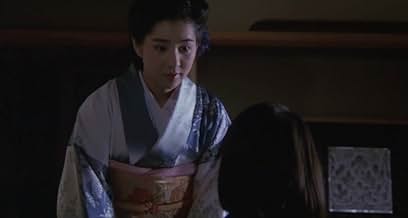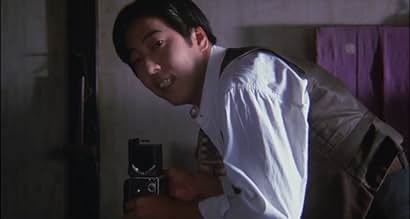IMDb-BEWERTUNG
7,2/10
1845
IHRE BEWERTUNG
Füge eine Handlung in deiner Sprache hinzuThe orphaned Makioka sisters look for a husband for their third sister, Yukiko, as the rebellious youngest sister, Taeko, is kept waiting her turn.The orphaned Makioka sisters look for a husband for their third sister, Yukiko, as the rebellious youngest sister, Taeko, is kept waiting her turn.The orphaned Makioka sisters look for a husband for their third sister, Yukiko, as the rebellious youngest sister, Taeko, is kept waiting her turn.
- Auszeichnungen
- 5 Gewinne & 9 Nominierungen insgesamt
Yonedanji Katsura
- Okuhata
- (as Kobeichô Katsura)
Michino Yokoyama
- Itani
- (as Michiyo Yokoyama)
Empfohlene Bewertungen
Not being in the mood for a Japanese take on "Masterpiece Theatre" I bailed about halfway through this Kon Icikawa offering. I notice several prior reviewers have compared this film to the works of Ozu. And while it is true that "Sisters" is a family drama, a genre Ozu all but invented in his country, it could not be more different in mood and feel. Where works such as "Late Spring" and "Tokyo Story" are contemplative, sad and often quite funny I found this film to be melodramatic, stiff and occasionally amusing. Perhaps the biggest difference between the two directors is in the pacing. Where Ozu's best films flow, slowly but inexorably, toward a powerful conclusion I found Ichikawa's pacing to be, well, let's use the "Masterpiece" analogy again. Too many indoor scenes that felt like skilled, dramatic readings from Tanizaki's great novel rather than a visual adaptation of it. Which is not to say the film isn't beautiful to look at. Indeed, it is gorgeous, with resplendant costumes and art direction that marvelously recreate Japan on the eve of Disaster (otherwise known as WW2). In fact, it is the look of the film that kept me from bailing sooner. C plus.
One should first read The Makioka Sisters by Junichiro Tanizaki to better understand this film. It is a very great novel about the life of four middle-class sisters in Osaka, Japan in the 1930's. The book describes in great detail the many subtleties of life in Japan which a Westerner can miss understanding in the film. The film rather closely follows the book and is very beautifully photographed.
The Makioka Sisters shows Ichikawa going back to one of the greatest 20th Century Japanese writers, Junichiro Tanizaki. Ichikawa had already directed, in the 1950s, a stunning adaptation of the Tanizaki novel The Key. The Key is an elliptical comedy about erotic fixation, with a lush visual style of saturated colors. The Makioka Sisters is a more subtle and delicate film, attuned as the novel was to the undercurrents running through the highly structured lives of the main characters. In some ways, the novel was Tanizaki's attempt to write a modern version of Murasaki Shikibu's Tale of Genji, and Ichikawa seems to have understood this in his adaptation, which brings a great deal of low-key humor and psychological insight to the proceedings, all very much in the Genji style. Essential viewing.
The Japanese movie entitled Sasameyuki (Light Snow) (1983) was shown in the U.S. with the title The Makioka Sisters. The film was based on a novel entitled The Makioka Sisters, so that change makes sense. The movie was co-written and directed by Kon Ichikawa.
The film takes place in the late 1930's, the years when Japan was a war with China. In retrospect, this was the start of WWII, but people didn't realize that at the time. There are some references to wartime scarcities, but this isn't a "homefront" movie.
The plot pivots on the marital status of the four sisters. Their parents are dead, and the oldest sister is responsible for the family name and the family honor. She's married, as is the second sister.
The third sister--Yukiko, portrayed by Sayuri Yoshinaga, is the shyest and most conservative of the four. The youngest sister--Taeko (Yûko Kotegawa) isn't as concerned about the strict rules of etiquette over which the others obsess. However, protocol dictates that she can't be married until Yukiko is married. So, much of the plot has to do with finding the right husband for Yukiko.
The film has colorful scenes of cherry blossoms and fall foliage. The glorious Japanese kimonos are worn by most women, and they are truly beautiful. (Because of the color and scenery, this movie would work better in a theater, but we had to make do with a DVD.)
Almost everything is serene on the surface of the film, but just under the surface there are intricate attachments and resentments. It's a long and quiet film, but it keeps your attention throughout.
For the record, Sayuri Yoshinaga (Yukiko) is one of Japan's greatest female actors. She starred in over 100 films. In my mind, she's the true star of this movie.
Some critics say that Ichikawa should be considered at the same level as the more famous Ozu, Kurosawa, and Mizoguchi. I don't have the depth of knowledge to know whether or not Ichikawa is the equal of the other three. However, after watching this movie, I know that he's a great director.
This film has an IMDb rating of 7.2, which is pretty good. I thought it was better than that, and rated it 9.
The film takes place in the late 1930's, the years when Japan was a war with China. In retrospect, this was the start of WWII, but people didn't realize that at the time. There are some references to wartime scarcities, but this isn't a "homefront" movie.
The plot pivots on the marital status of the four sisters. Their parents are dead, and the oldest sister is responsible for the family name and the family honor. She's married, as is the second sister.
The third sister--Yukiko, portrayed by Sayuri Yoshinaga, is the shyest and most conservative of the four. The youngest sister--Taeko (Yûko Kotegawa) isn't as concerned about the strict rules of etiquette over which the others obsess. However, protocol dictates that she can't be married until Yukiko is married. So, much of the plot has to do with finding the right husband for Yukiko.
The film has colorful scenes of cherry blossoms and fall foliage. The glorious Japanese kimonos are worn by most women, and they are truly beautiful. (Because of the color and scenery, this movie would work better in a theater, but we had to make do with a DVD.)
Almost everything is serene on the surface of the film, but just under the surface there are intricate attachments and resentments. It's a long and quiet film, but it keeps your attention throughout.
For the record, Sayuri Yoshinaga (Yukiko) is one of Japan's greatest female actors. She starred in over 100 films. In my mind, she's the true star of this movie.
Some critics say that Ichikawa should be considered at the same level as the more famous Ozu, Kurosawa, and Mizoguchi. I don't have the depth of knowledge to know whether or not Ichikawa is the equal of the other three. However, after watching this movie, I know that he's a great director.
This film has an IMDb rating of 7.2, which is pretty good. I thought it was better than that, and rated it 9.
The Makioka Sisters isn't really my kind of film, owing to it mostly being about matchmaking and set some decades ago (at least on the surface; there's a little more to chew on beyond the premise). That being said, I found enough to like here.
As the title might imply, the sisters really take charge here, and it was refreshing to watch a film like this set as far back as the late 1930s (to my knowledge, a very culturally conservative time in Japan's history) have female characters with agency who took charge. Mainly, it's the two older sisters of the four looking over the two younger sisters, given they've all been orphaned, with the two older siblings sometimes butting heads while doing what's right for the younger ones. They all feel like they have something of a say over where they're going in life (I guess the older siblings more so than the younger ones, but still), and that was good to see, and I imagine inspiring.
The acting is all solid. Male characters are put in the background, but aren't just there to be mocked or ridiculed. It feels like a feminist movie in a slightly more relaxed way than this premise might be done today, and I think I respect it for that. It's all nice and real and genuine, and doesn't call attention or show off regarding how much agency it's giving its female characters; it's not just doing it to get applause or grandstand.
The film also looks nice, which I think can be said about anything Kon Ichikawa directed. Unfortunately, it is a little long, at 140 minutes. Maybe about 110 minutes would've felt like the sweet spot for me, but trying runtime aside (it's a little boring in parts), I did mostly like The Makioka Sisters.
As the title might imply, the sisters really take charge here, and it was refreshing to watch a film like this set as far back as the late 1930s (to my knowledge, a very culturally conservative time in Japan's history) have female characters with agency who took charge. Mainly, it's the two older sisters of the four looking over the two younger sisters, given they've all been orphaned, with the two older siblings sometimes butting heads while doing what's right for the younger ones. They all feel like they have something of a say over where they're going in life (I guess the older siblings more so than the younger ones, but still), and that was good to see, and I imagine inspiring.
The acting is all solid. Male characters are put in the background, but aren't just there to be mocked or ridiculed. It feels like a feminist movie in a slightly more relaxed way than this premise might be done today, and I think I respect it for that. It's all nice and real and genuine, and doesn't call attention or show off regarding how much agency it's giving its female characters; it's not just doing it to get applause or grandstand.
The film also looks nice, which I think can be said about anything Kon Ichikawa directed. Unfortunately, it is a little long, at 140 minutes. Maybe about 110 minutes would've felt like the sweet spot for me, but trying runtime aside (it's a little boring in parts), I did mostly like The Makioka Sisters.
Wusstest du schon
- WissenswertesThe story spans the period from autumn, 1936, to April, 1941, ending about seven months before the Japanese attack on Pearl Harbor. The novel references a number of contemporary events, such as the Kobe flood of 1938, the Second Sino-Japanese War, and the growing tensions in Europe.
- PatzerTaeko is clearly wearing a strapless bra when she's in the bathtub.
- VerbindungenReferenced in Every Day a Good Day (2018)
Top-Auswahl
Melde dich zum Bewerten an und greife auf die Watchlist für personalisierte Empfehlungen zu.
Details
Zu dieser Seite beitragen
Bearbeitung vorschlagen oder fehlenden Inhalt hinzufügen

























